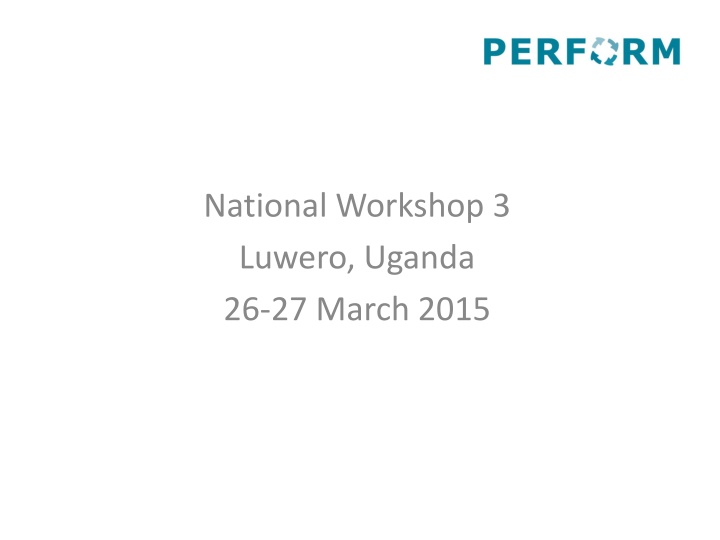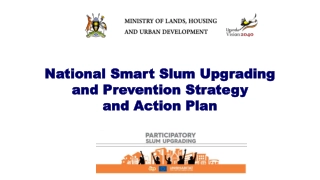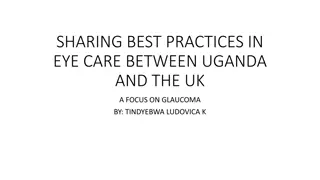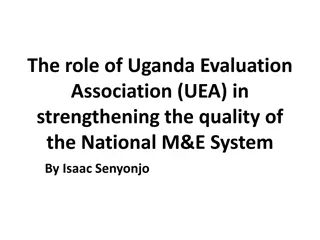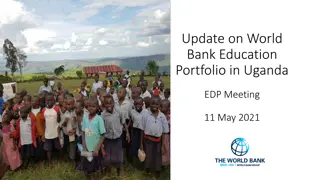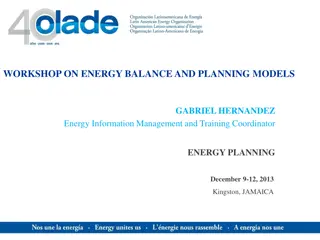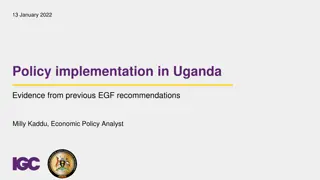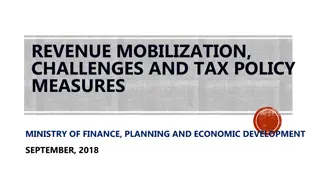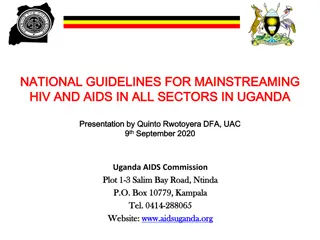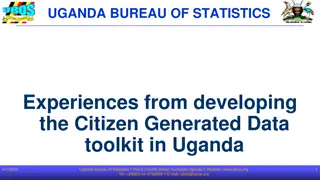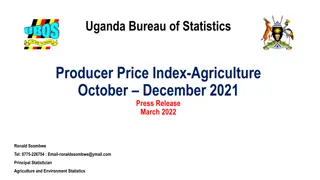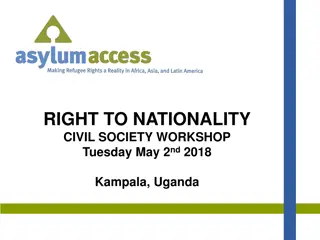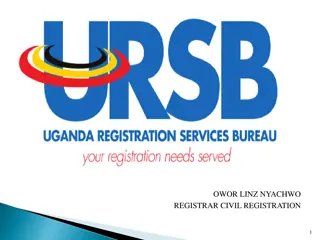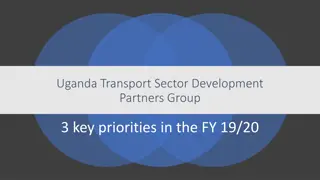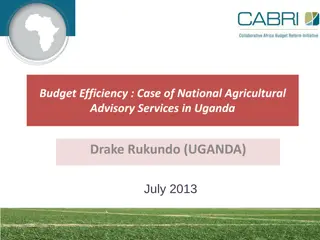National Workshop 3 in Luwero, Uganda - Evaluation and Planning
This document outlines the objectives, expected outputs, programme schedule, project phases, and timeline of the National Workshop 3 held in Luwero, Uganda in March 2015. The workshop focused on sharing key evaluation findings, identifying gaps, discussing quantitative data, and planning next steps for the project.
Download Presentation

Please find below an Image/Link to download the presentation.
The content on the website is provided AS IS for your information and personal use only. It may not be sold, licensed, or shared on other websites without obtaining consent from the author.If you encounter any issues during the download, it is possible that the publisher has removed the file from their server.
You are allowed to download the files provided on this website for personal or commercial use, subject to the condition that they are used lawfully. All files are the property of their respective owners.
The content on the website is provided AS IS for your information and personal use only. It may not be sold, licensed, or shared on other websites without obtaining consent from the author.
E N D
Presentation Transcript
National Workshop 3 Luwero, Uganda 26-27 March 2015
Objectives To share key findings from the evaluation with the DHMTs To identify any gaps or possible errors in the key findings from the evaluation To discuss issues with the quantitative data collected in the evaluation To plan the next steps until end of August and after PERFORM has finished
Expected outputs Any gaps or errors in interpretation in the key findings from the evaluation, which will feed into a revised country report Understanding of the issues with the quantitative data and possible ways forward Plans for next steps Brief report of workshop
Programme: day 1 Time 8.30 9.00 9.00 9.45 Programme activities Registration Welcome Introduction of participants Introduction to workshop Updates from districts: (15 minutes each) Jinja Luwero Kabarole 10.35 11.00 Tea / coffee break 11.00 11.30 Evaluation of PERFORM: methods and key findings and conclusions Introduction to group work 11.30 12.30 Group work: reviewing key findings from evaluation Facilitator Enid Sebastian Olikira Baine 9.45 10.35 Saul Kamukama Enid Sebastian or Saul Sebastian Saul Freddie or Milly or Jo Jo to rotate Enid 12.30 2.00 2.00 3.30 Lunch Group work: reviewing key findings from evaluation Tea / coffee break Feedback from group work: each district presents feedback 3.30 4.00 4.00 5.00 Enid Jo
Programme: day 2 Time 8.00 8.30 8.30 9.00 9.00 10.30 Programme activities Registration Quantitative data issues Group work: quantitative data issues Facilitator Enid Sebastian Sebastian Saul Freddie or Milly or Jo Jo to rotate Enid Saul Saul Enid 10.30 11.00 Tea / coffee break 11.00 12.30 Group work: way forward 12.30 1.00 Feedback from group work 1.00 2.00 Lunch and departure
Project phases Preparation for implementation Phase one Research implementation Phase two Evaluation and feedback Phase three
Timeline: where are we now? Initial Situation Analysis Jun-Aug 2012 Implementation of bundles Feb 2013 Aug 2014 Consortium workshop 2 Nov 2012 Evaluation Aug-Oct 2014 National workshop 1 Oct 2012 National workshop 2 Feb 2013 Consortium workshop 3 Nov 2013 National workshop 3 March 2015
Methods Qualitative interviews and discussions Review of documents Quantitative: utilization of services, HR data, finance data from each facility in each district
Methods: qualitative Kabarole Jinja Luwero In depth interview DHMT 4 5 4 Focus group discussion DHMT 1 1 1 In depth interview sub district manager 6 6 6 In depth interview sub district staff 6 6 6 In depth interview stakeholder 4 4 4 Total 21 22 21 Interviews and discussion were transcribed verbatim Analysed thematically with support from NVivo software: coded using a thematic framework; then summarised under each theme and synthesized with data from documents
Methods: review of documents Documents included: diaries, problem trees, bundles plans, district plans and reports, DHMT and DHT minutes, workshop and inter district meeting reports Documents were analysed thematically: coded using a thematic framework; summarized under each theme and synthesized with data from interviews and discussions
Methods: quantitative District data: collected from HMIS in discussion with biostatistician, DHO and accountant Facility data: collected from HMIS Analysis: data is still being cleaned; some problems with data
Key findings: action research cycle Management strengthening intervention (action research) has helped DHMTs develop plans for improving workforce performance based on through problem analysis Plans are being implemented and show positive results Most plans include strengthening existing performance management systems e.g. supervision, appraisal, monitoring absenteeism
Key findings: action research cycle During implementation period, plans were modified: Luwero reactivated QI teams Jinja recognized best performing staff and facilities Kabarole introduced spot check supervision visits This modification should lead to wider improvements in performance management
Key findings: PERFORM approach DHMT members were engaged in and liked the approach (identify and analyse problems, develop bundles, implement, observe) Already familiar with some elements but more freedom to apply to their priority areas Some DHMTs adapting approach to routine work Some DHMTs would like continued support with this approach and more facilitated communication with districts
Conclusions Management strengthening approach appears to be acceptable, effective and viable at district level DHMTs have improved problem solving and planning skills and a better understanding of workforce performance problems and appropriate strategies
Recommendations 1. Ways of providing some ongoing support for the next annual budget cycle to the three participating DHMTs should be investigated, so the teams can consolidate their skills for improving the management of workforce performance. Particular support should be provided for monitoring the effects of the strategies and continued information exchange between districts. 2. The potential and benefits for using this approach in other districts should be explored. Clustering of districts could be considered to make external facilitation and inter-district exchange more efficient. PERFORM facilitation materials, which will be made available, could be used with modifications if necessary.
Recommendations (cont.) 3. The critical mass of DHMT members who have participated in the PERFORM approach could be drawn on to develop a pool of facilitators to support new districts wishing to use this approach for management strengthening. The participating districts could also host orientation visits for DHMTs from other districts wishing to learn more about the approach. 4. Effective methods of improving workforce performance within the financial and decision-making constraints of the DHMT could be reviewed with the intention of further dissemination by the relevant departments of the Ministry of Health and the Ministry of Local Government and other partners involved in supporting workforce performance improvement.
Instructions for group work (districts) Review and discuss the key findings and conclusions from evaluation Fair reflection? Any changes to be made? Anything missing?
Group work Prepare a short presentation (maximum 15 minutes) Most important findings Things that we have learned during PERFORM Things that we want to do in the future What you would tell the CAO about the PERFORM approach The message you would like Sebastian and team to give to the MoH about PERFORM
